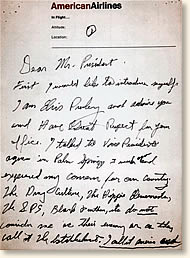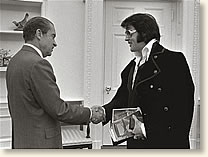|
President Nixon Meets Elvis, 1970
It all began at a party in Palm Springs, California in early December 1970.
 |
Elvis's hand-written letter
Click to read a transcript |
Elvis's reign as the "King of Rock and Roll" had been in decline since the "British
Invasion", led by the Beatles, had jolted America's pop music market in 1964.
Elvis was still an American idol and had begun a comeback in his singing career.
However, his energies in recent years had been devoted to making a series of
forgettable Hollywood films. In a conversation with Vice
President Agnew at the party, Elvis expressed his concern for what he felt were
threats to American culture posed by, not only the British
Invasion, but also the drug culture, the radical SDS, the hippies and the
Black Panthers. Elvis wanted to do something about it.
Three weeks later, Elvis, accompanied by two body guards, was bound for Washington,
DC aboard an American Airlines flight. He spent his time writing a letter to
the President. Beginning "Dear Mr. President, First, I would like to introduce
myself. I am Elvis Presley. . ." the rock star expressed his desire to be made
a "Federal
Agent at Large" in order to communicate with and report on what he felt were
deleterious factions threatening America. He believed his star-status would allow him a non-threatening entrance into the closed environment of these groups. A
federal law appointment would give him credibility.
Elvis arrived at the White House gate on the morning of December 21 with his two body guards. He carried some family photos and a commemorative World War II .45 caliber pistol intended as gifts for the President. He handed his letter to the guards and waited.
Elvis's arrival ignited a flurry of activity among the White House staff. White
House aide Dwight Chapman sent a quick memo to his boss, Chief of Staff H.R.
Haldeman. Chapman attached Elvis's letter and advised that the President meet
with the rock star. Haldeman concurred and Elvis was scheduled to meet with
Nixon at 12:30 that afternoon.
Supplied with talking points prepared by his staff,
President Nixon met with Elvis in the Oval office. Also in attendance were Elvis's
bodyguards, a White House photographer, and presidential aide Bud Krogh who kept
notes of the meeting:
"The meeting opened with pictures taken of the President and Elvis Presley.
Presley immediately began showing the President his law enforcement paraphernalia including badges from police departments in California, Colorado and Tennessee. Presley indicated that he had been playing Las Vegas and the President indicated that he was aware of how difficult it is to perform in Las Vegas.
 |
Nixon and Elvis in the Oval Office
Click to see Elvis's gift |
The President mentioned that he thought Presley could reach young people, and
that it was important for Presley to retain his credibility. Presley responded
that he did his thing by singing. He said he could not get to the kids if he
made a speech on stage, that he had to reach them in his own way. The President
nodded agreement.
Presley indicated that he thought the Beatles had been a real force for anti-American spirit. He said that the Beatles came to this country, made their money, and then returned to England where they promoted an anti-American theme. The President nodded in agreement and expressed some surprise. The President then indicated that those who use drugs are also those in the vanguard of anti-American protest. Violence, drug usage, dissent, protest all seem to merge in generally the same group of young people.
Presley indicated to the President in a very emotional manner that he was 'on
your side.' Presley kept repeating that he wanted to be helpful, that he wanted
to restore some respect for the flag which was being lost. He mentioned that
he was just a poor boy from Tennessee who had gotten a lot from his country,
which in some way he wanted to repay. He also mentioned that he is studying
Communist brainwashing and the drug culture for over ten years. He mentioned
that he knew a lot about this and was accepted by the hippies. He said he could
go right into a group of young people or hippies and be accepted which he felt
could be helpful to him in his drug drive. The President indicated again his
concern that Presley retain his credibility.
At the conclusion of the meeting, Presley again told the President how much he supported him, and then in a surprising, spontaneous gesture, put his left arm around the President and hugged him.
In going out, Presley asked the President if he would see his two associates. The President agreed and they came over and shook hands with the President briefly. At this meeting, the President thanked them for their efforts and again mentioned his concern for Presley's credibility."
References:
The documents related to Nixon's meeting with Elvis are part
of the collection of the National Archives: Nixon Presidential Materials Project,
White House Central Files: Subject Categories: Health (HE); Folder Title: EX
HE 5-1 1/1/72-1/31/72; Box Number: 19
How To Cite This Article:
"President Nixon Meets Elvis, 1970" EyeWitness to History, www.eyewitnesstohistory.com (2007).
| 





